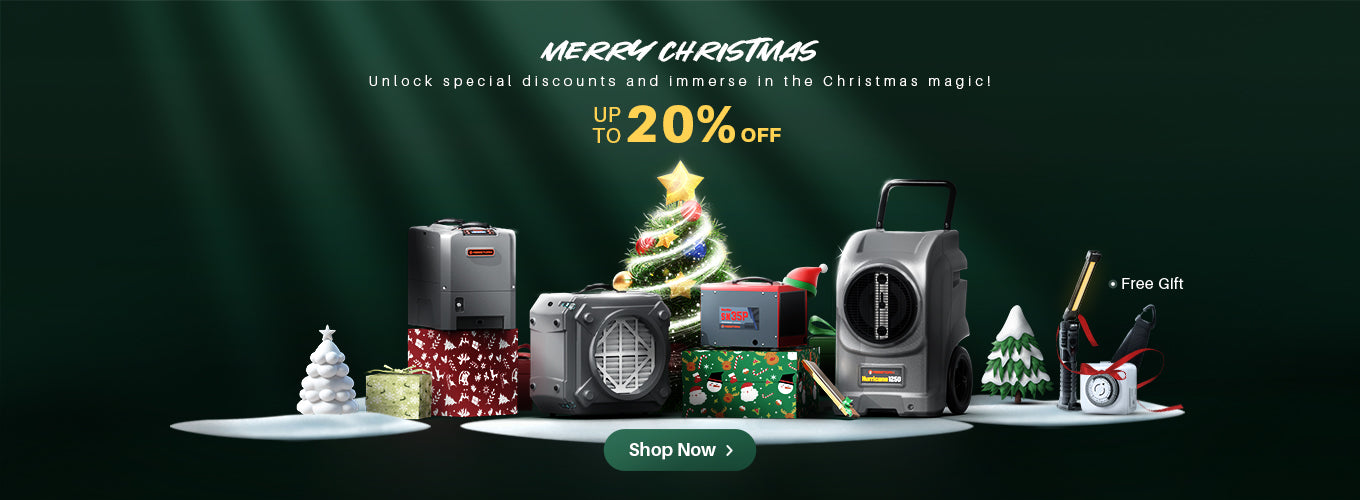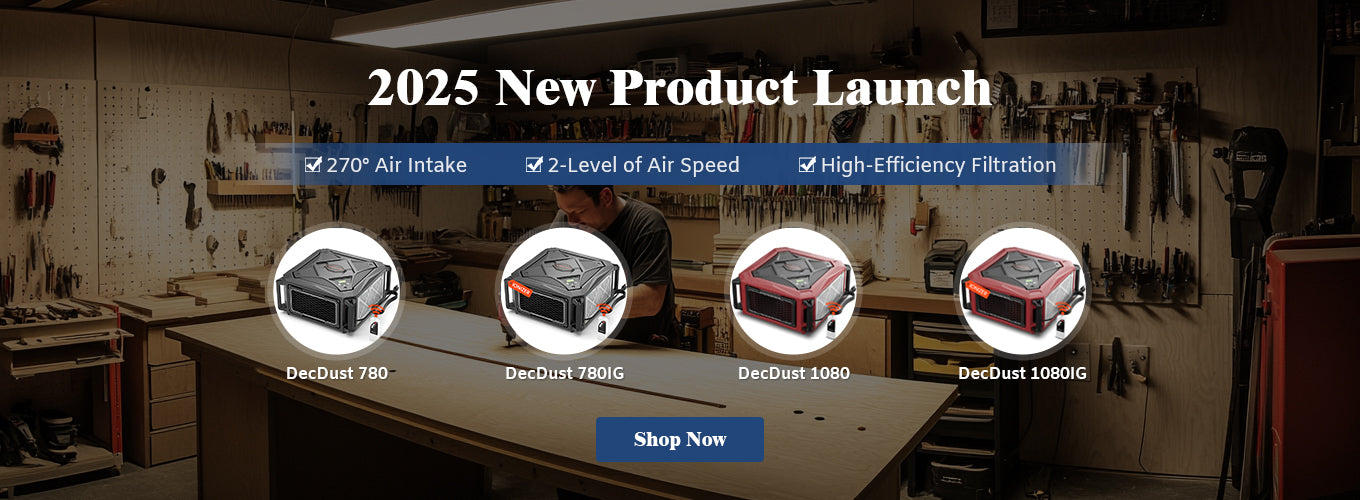Humidity Control and Sustainable Development
Efficient humidity control maintains a healthy indoor environment and supports sustainability. Excessive humidity can lead to a range of problems, from structural damage to increased energy consumption, all of which present environmental and operational challenges. Addressing these issues not only promotes sustainability but also ensures efficient and cost-effective operations.
Environmental Issues Caused by Excessive Humidity
Excessive humidity creates fertile ground for problems that affect both the environment and operational efficiency. These challenges highlight the importance of effective humidity management:
- Structural Damage: Persistent moisture can seep into walls, ceilings, and flooring, compromising structural integrity over time. Materials like wood and plasterboard are particularly vulnerable, as they can warp, rot, or weaken when exposed to high humidity. The frequent need for repairs or replacements due to moisture damage generates significant construction waste, adding to environmental pollution.
- Health Risks: High humidity fosters the growth of mold, mildew, and bacteria, which release spores and toxins into the air. These pollutants can cause or exacerbate respiratory issues, especially in vulnerable individuals such as those with asthma, allergies, or weakened immune systems. Maintaining proper humidity levels reduces the likelihood of these health concerns and promotes a safer environment for occupants.
- Energy Inefficiency: Humid air is harder to cool, forcing HVAC systems to work overtime to maintain a comfortable indoor climate. This results in higher energy consumption and elevated utility costs. The additional energy use contributes to greenhouse gas emissions, increasing the carbon footprint of buildings and facilities.
Humidity Management as a Key to Sustainable Development
Sustainable development requires a proactive approach to environmental challenges, and humidity control is a practical and impactful solution. Organizations that implement an effective dehumidification strategy not only address current operational issues but also contribute to broader goals such as environmental protection and resource efficiency.
Temperature control prevents moisture-related problems. Dehumidifiers can be used to maintain moisture balance and prevent mold growth, structural damage, and other moisture-related problems.
Effective humidity control prevents damage to goods and equipment, reduces the need for extensive repairs, and minimizes material waste, especially in commercial and industrial environments. Supports a circular economy that emphasizes reuse and sustainability.
Dehumidification reduces the workload of the HVAC system, thereby reducing energy consumption and subsequently lowering electricity bills. This reduction in energy use not only saves costs but also lessens the environmental impact, directly contributing to carbon reduction goals.
Balancing humidity not only protects materials and systems but also improves air quality by reducing airborne pollutants. This provides a healthier environment for occupants, increases productivity, and reduces healthcare costs associated with poor air quality.
How Commercial Dehumidifiers Drive Sustainable Development
Commercial dehumidifiers play a key role in creating a more sustainable future. The role of dehumidifiers goes beyond controlling humidity; they also help to improve operational efficiency, reduce resource consumption, and lower environmental impact.
Reducing Energy Consumption and Saving Electricity
One of the primary benefits of commercial dehumidifiers is their ability to reduce energy consumption. Modern dehumidifiers are designed with energy efficiency in mind, ensuring that businesses not only maintain optimal humidity levels but also do so with minimal power usage. The advantages include:
Lower Energy Bills:
- Dehumidifiers consume far less energy than HVAC systems that work overtime to control humidity. By maintaining optimal humidity, they reduce the need for excessive cooling or heating, which ultimately lowers energy consumption and reduces costs.
Optimized Performance:
- With regulated humidity, equipment such as air conditioners, refrigeration units, and HVAC systems perform more efficiently. Controlled environments reduce the strain on these systems, allowing them to operate with fewer fluctuations, leading to reduced energy-intensive operations.
Extending Equipment Life and Reducing Maintenance Costs
Humidity doesn’t just affect the immediate environment; it also accelerates wear and tear on machinery and infrastructure.
High humidity causes rust, corrosion, and material degradation, which shortens the lifespan of machinery, electronics, and building materials. Dehumidifiers prevent excessive moisture from accumulating, which helps protect equipment and structures from these damaging effects. As a result, businesses enjoy longer operational lifespans for their equipment and assets.
By maintaining ideal humidity levels, businesses can reduce the need for frequent repairs and replacements, significantly lowering maintenance costs. This not only reduces operational costs but also helps minimize waste by extending the life of existing equipment.
Lowering Carbon Footprint to Support Green Operations
Every kilowatt-hour of electricity saved by commercial dehumidifiers reduces the carbon footprint of a business. Dehumidifiers are essential for lowering the energy demand of a building, which directly impacts carbon emissions.
As businesses reduce their energy consumption through efficient dehumidification, they also decrease their reliance on fossil-fuel-powered electricity, which is the primary source of greenhouse gas emissions. By using less energy, companies lower their overall carbon footprint.
With a growing emphasis on corporate responsibility and green initiatives, businesses are expected to meet sustainability benchmarks. Installing energy-efficient dehumidifiers helps businesses fulfill these requirements while contributing to long-term environmental protection.
Adopting dehumidifiers as part of a broader green operation strategy not only supports sustainability but also enhances a company’s reputation among customers, stakeholders, and regulators. Demonstrating an ongoing commitment to sustainability helps businesses build trust with environmentally conscious consumers.
Improving Air Quality to Enhance Health and Productivity
Humidity doesn’t just affect the physical environment; it also directly impacts indoor air quality. High humidity levels create a breeding ground for mold, mildew, and dust mites, all of which can compromise air quality and harm employee health. Commercial dehumidifiers improve air quality in several ways:
- Reducing Airborne Contaminants: Dehumidifiers prevent the growth of mold and mildew, which can release spores into the air. These airborne pollutants trigger allergies, asthma, and other respiratory problems. By controlling humidity, dehumidifiers help maintain a cleaner, healthier environment, reducing the spread of harmful contaminants.
- Creating a More Comfortable and Healthier Workspace: High humidity can make indoor environments feel stuffy and uncomfortable, reducing employee concentration and productivity. By maintaining optimal humidity levels, commercial dehumidifiers ensure a more pleasant and breathable work environment, leading to enhanced comfort and overall well-being.
- Boosting Employee Productivity: Healthy employees are more productive and less likely to take sick leave. By improving air quality, dehumidifiers help reduce the number of health-related absences, leading to better overall performance and success. In turn, this contributes to the organization's bottom line and supports sustainability goals.
How ALORAIR Dehumidifiers Promote Sustainable Development
ALORAIR dehumidifiers play an essential role in driving sustainability across industries. By focusing on energy efficiency, durability, and eco-friendly practices, these devices not only improve indoor air quality but also contribute significantly to environmental and operational sustainability. Below, we explore how ALORAIR dehumidifiers support green operations and sustainable development.
High Efficiency and Energy-Saving Design
One of the standout features of ALORAIR dehumidifiers is their energy-efficient design, which ensures businesses achieve maximum performance with minimal energy consumption. These dehumidifiers are equipped with advanced technologies that optimize airflow and moisture extraction. Here’s how ALORAIR dehumidifiers contribute to sustainability:
- Optimized Energy Use: ALORAIR dehumidifiers are designed to consume less electricity while maintaining effective moisture removal. By keeping energy consumption low, businesses can reduce their operational costs without compromising on dehumidification performance.
- Reduced Strain on HVAC Systems: Excess moisture in the air forces HVAC systems to work harder, which increases energy consumption. By removing excess humidity, ALORAIR dehumidifiers lighten the load on HVAC systems, helping them operate more efficiently. This results in overall energy savings and improved building efficiency.
- Long-Term Savings: By reducing the need for additional air conditioning or heating to combat the effects of humidity, ALORAIR dehumidifiers contribute to long-term cost savings. The energy-efficient operation means businesses can cut down on electricity bills, making these units a smart investment in both operational efficiency and sustainability.
Eco-Friendly and Sustainable Materials
ALORAIR not only focuses on energy efficiency but also on using eco-friendly materials in the production of their dehumidifiers. This approach ensures that their products are environmentally responsible from production to disposal. Some eco-friendly practices include:
- Durable Construction: ALORAIR dehumidifiers are built with high-quality materials designed to last. The robust construction extends the life of the device, reducing the need for frequent replacements and minimizing e-waste. Longer-lasting equipment contributes to sustainability by reducing the demand for new materials and resources.
- Recyclable Components: Many components of ALORAIR dehumidifiers are recyclable, making them easier to dispose of responsibly when the unit reaches the end of its life. This reduces the environmental impact associated with waste and ensures that materials are reused rather than discarded.
- Sustainable Manufacturing: ALORAIR emphasizes sustainability in its manufacturing processes by minimizing waste and using materials that are sustainably sourced. The company’s focus on efficient production methods helps reduce the carbon footprint of its devices.
By choosing ALORAIR dehumidifiers, businesses can help minimize environmental waste and contribute to a circular economy, where resources are reused, and sustainability is prioritized.
Suitable for a Variety of Commercial Environments
ALORAIR dehumidifiers are designed to meet the needs of various commercial environments, from small offices to large industrial facilities. Their flexibility makes them ideal for businesses across different sectors that want to integrate sustainability into their operations. Some of the environments where ALORAIR dehumidifiers thrive include:
In industries where moisture can damage products or machinery, ALORAIR dehumidifiers help maintain optimal humidity levels. By protecting equipment and preventing moisture-related issues like rust and corrosion, these devices extend the life of machinery, reduce maintenance costs, and improve overall operational efficiency.
For retail shops, restaurants, and office buildings, maintaining a comfortable and healthy indoor environment is essential. ALORAIR dehumidifiers help create a balanced atmosphere by removing excess moisture, which not only improves air quality but also enhances comfort and productivity.
In warehouses and storage facilities, moisture can lead to the deterioration of stored goods, especially items like electronics, paper products, or clothing. ALORAIR dehumidifiers protect goods from mold, mildew, and other moisture-related damage, ensuring that inventory is kept in optimal condition.
Enhancing Corporate Image and Customer Trust
Sustainability is a core value for many modern businesses, and customers are increasingly looking for companies that prioritize eco-friendly practices. By integrating ALORAIR dehumidifiers into their operations, businesses can enhance their corporate image and build customer trust. Here’s how:
- Showcasing Commitment to Sustainability: Using energy-efficient and environmentally responsible products like ALORAIR dehumidifiers helps businesses demonstrate their commitment to sustainability. This resonates with eco-conscious consumers who prefer to support companies that actively work to reduce their environmental impact.
- Attracting Green Certifications: Many industries are now striving for green certifications such as LEED (Leadership in Energy and Environmental Design) or BREEAM (Building Research Establishment Environmental Assessment Method). ALORAIR dehumidifiers contribute to meeting the requirements for these certifications by improving energy efficiency and reducing environmental impact.
- Building Customer Loyalty: By adopting green technologies, businesses show that they care about more than just profits—they care about the environment and the well-being of their communities. This commitment can help foster strong relationships with customers and stakeholders, increasing brand loyalty and trust.
- Appealing to Sustainability-Minded Investors: Businesses that integrate sustainable practices into their operations are more likely to attract investors who prioritize environmental, social, and governance (ESG) criteria. ALORAIR dehumidifiers contribute to a greener operational footprint, making businesses more attractive to these investors.
Conclusion: The Importance of Commercial Dehumidifiers for Sustainable Development
Sustainable development is no longer just an option—it’s a necessity for businesses looking to thrive in today’s environmentally conscious market. Excessive humidity poses risks to health, infrastructure, and energy efficiency, but commercial dehumidifiers provide an effective solution.
By reducing energy consumption, lowering maintenance costs, and supporting green operations, commercial dehumidifiers are essential tools for building sustainable businesses. ALORAIR’s Energy Star-rated dehumidifiers take it a step further, combining high efficiency with eco-friendly materials to offer unparalleled performance.
Investing in advanced dehumidification technology doesn’t just save money—it promotes a healthier, greener future. Whether you’re managing a warehouse, office, or industrial facility, choosing a solution like ALORAIR dehumidifiers ensures you’re contributing to sustainable development while enhancing operational efficiency.







